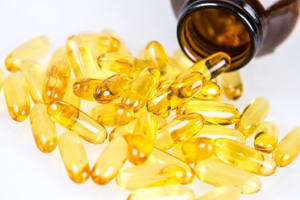- Home
- Editorial
- News
- Practice Guidelines
- Anesthesiology Guidelines
- Cancer Guidelines
- Cardiac Sciences Guidelines
- Critical Care Guidelines
- Dentistry Guidelines
- Dermatology Guidelines
- Diabetes and Endo Guidelines
- Diagnostics Guidelines
- ENT Guidelines
- Featured Practice Guidelines
- Gastroenterology Guidelines
- Geriatrics Guidelines
- Medicine Guidelines
- Nephrology Guidelines
- Neurosciences Guidelines
- Obs and Gynae Guidelines
- Ophthalmology Guidelines
- Orthopaedics Guidelines
- Paediatrics Guidelines
- Psychiatry Guidelines
- Pulmonology Guidelines
- Radiology Guidelines
- Surgery Guidelines
- Urology Guidelines
Omega 3 fatty acids may soothe sore, stiff muscles after tough exercise

According to new research, Long term use of Omega 3 fatty acids may mitigate muscle stiffness and soreness after a tough exercise.
After a tough workout and heavy exercise, there is bound to be an aggravation of muscle pain due to muscular stiffness. It has been propagated that micro-tears in your muscles from working out cause inflammation, which in turn leads to muscle pain and soreness. The researchers conducted the study to investigate the effect of supplementation of Omega 3 fatty acids on the damage of the muscles and muscle stiffness after heavy strength training exercises. The study has been published in the Journal of the International Society of Sports Nutrition.
Omega 3 fatty acids are found in foods, such as fish and flaxseed, and in dietary supplements such as fish oil. The three main omega-3 fatty acids are alpha-linolenic acid (ALA), eicosapentaenoic acid (EPA), and docosahexaenoic acid (DHA). ALA is found mainly in plant oils such as flaxseed, soybean, and canola oils. DHA and EPA are found in fish and other seafood.
Omega 3 fatty acids like omega (EPA) and docosahexaenoic acid (DHA) are a major component of the cell membrane and accumulate in the muscle cellular membrane after intake of fish oil. Although the mechanism is unclear, EPA and DHA supplementation from fish oil may inhibit muscle damage after exercise by protecting the muscle cell membrane and promoting an anti-inflammatory response.
The study included 16 men who were randomly assigned to one of two groups. One consumed eight placebo capsules (300 milligrams of corn oil) per day for eight weeks leading up to the exercise portion of the study and then for five days afterwards. The other consumed eight fish oil supplements (300 mg) per day for 62 days (before, during, and after the exercise portion) that contained both EPA and DHA—two types of omega-3s.
In the exercise portion of the study, participants performed six sets of 10 dumbbell preacher curls—which are done on a preacher bench or incline bench where your upper arm doesn’t leave the bench—at different angles with 90 seconds of rest in between. This exercise emphasizes the eccentric contraction or the lowering phase of an exercise where your muscle is lengthened.
The researchers measured the participants’ elbow joint range of motion, muscle soreness, muscle stiffness, and muscle swelling before, immediately after, and one, two, and five days after exercise.
It was found that the patients who took the Omega 3 fatty acids/fish oil supplements were less stiff and sore, their muscles weren’t as swollen, and their range of motion was higher than those who took the placebo supplements. And while the researchers aren’t 100 per cent sure why the fish oil seemed to help, they believe its omega-3s protect the cells around your muscle fibres and act as an anti-inflammatory agent.
The present study showed that Omega 3 Fatty acid supplementation has a positive role in inhibiting muscle stiffness after ECCs.
More research must be done before firm conclusions can be made but meanwhile one can bolster his diet with more omega-3 rich foods, like fish, seeds or nuts. Besides, research has shown that they can boost your heart and immune system function, too.
For more details click on the link: https://doi.org/10.1186/s12970-019-0283-x

Disclaimer: This site is primarily intended for healthcare professionals. Any content/information on this website does not replace the advice of medical and/or health professionals and should not be construed as medical/diagnostic advice/endorsement or prescription. Use of this site is subject to our terms of use, privacy policy, advertisement policy. © 2020 Minerva Medical Treatment Pvt Ltd